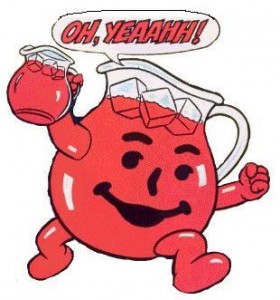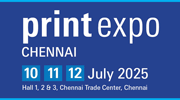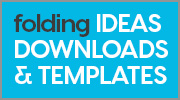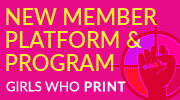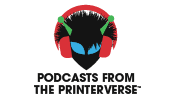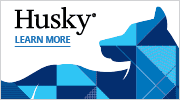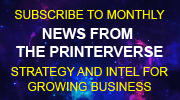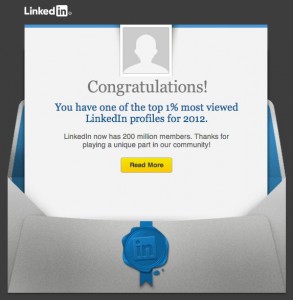
Did you recently receive an email from LinkedIn congratulating you for having one of the top 1%, 5% or 10% most viewed profiles for 2012, and share that through social channels? Congratulations might not exactly be in order then, since you are also among the masses of people who fell into the brilliant trap of their marketing promotion.
As I have written in numerous blogs, I have a love/hate relationship with LinkedIn. Amongst my many hate issues are: they have secret policies which are usually answered as “this is a known issue and we are working on it” from customer service (they are not by the way); the consistent removal of access to features that have been free since day one, unless you now pay; their use of groups to generate income, but poor treatment of group owners; and a bunch of “updates” they attempt to spin as beneficial to groups, but are only beneficial to them. It’s their platform, I get it, but sometimes I feel like they abuse their power.
As for love, well I am writing this blog because of LinkedIn. My group Print Production Professionals is 49,000+ and still growing. My seven subgroups are also growing; especially Print Buying Pros now over 1,500 strong, and my Digital Advertising Group is almost at 7,500. I have 15,600+ connections that allow me to reach 20,369,236+ LinkedIn members, over 50,000+ new people in my network since February 23, and my profile is viewed hundred’s of times a week.
So why didn’t I get an email?
Simple. Because of the hate factor, through my account privacy settings I don’t allow LinkedIn or their partners to send me SOLICITATIONS. And that is what is hidden behind this promotion. FREE users would have to UPGRADE to see all those people who made their profile so popular, and now had an incentive to do so.
Speaking of which, with 200 million members, if you were actually part of the top 10% (some people have said they received the email but haven’t been active on LinkedIn for years) that makes you one of 20 million people. To put that in perspective, NY State’s population in 2012 was just under 19.5 million, and it’s the third most populous state after California (37+ million) and Texas (25+ million).
If you did, you aren’t alone and LinkedIn pretty much counted on nobody doing the math. They also counted on recipients being impressed with their “achievement” and sharing it through their channels. It worked, and this topic trended on Twitter with over 80,000 Tweets, was the most popular search on Google for a few days, and I’m still deleting the posts about it in my LI groups.
There is no doubt, the “you are special” strategy worked as far as sharing and basically promoting LinkedIn globally. Whether or not people upgraded we wont ever know, but again if we do a little math the numbers are quite staggering. Let’s pretend that 20 million people actually received the email and read it. If only 5% or 1 million people upgraded for $7.95/month that works out to $95,400,000 on the lowest level. Some may have upgraded to $19.95/month or $39.95/month. Not bad ROI for an email.
But is money all that matters?
We are all in business to make money, and now that LinkedIn is a publicly traded company it has responsibilities to its shareholders as well. That is a given. But in many circles, this promotion is being discussed in very unflattering terms. Did LinkedIn count on people not to do the math? Play on their ego’s to share this promotion with others? Trick them into clicking on links?? In other words, did LinkedIn’s strategy revolve around assuming their users and customers are easily manipulated and dumb?
In other circles, this is being discussed as one of the most successful promotions ever. It has all the elements of a great marketing case study, up until the part where we need to know if people bought the upgrade. But if we base the success on awareness, even though people still might not realize it was a solicitation, they most likely have seen it being shared, somewhere.
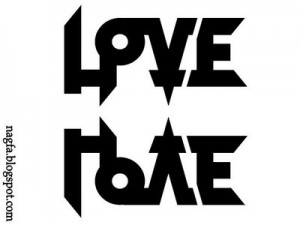 Like I said, I have a love/hate relationship with LinkedIn, and that extends to this promotion. Had I received an email, I doubt I would have done the math, but I certainly would have been very skeptical about LinkedIn taking the time to let me know anything if it didn’t add to their bottom line. A few clicks would have proven my theory and sent the email to the trash, but it’s a good reminder to make sure you know what you are sharing, why you are sharing it, and the motives behind why it was sent to you.
Like I said, I have a love/hate relationship with LinkedIn, and that extends to this promotion. Had I received an email, I doubt I would have done the math, but I certainly would have been very skeptical about LinkedIn taking the time to let me know anything if it didn’t add to their bottom line. A few clicks would have proven my theory and sent the email to the trash, but it’s a good reminder to make sure you know what you are sharing, why you are sharing it, and the motives behind why it was sent to you.
LinkedIn had the element of surprise and definitely got a free pass on this one. Let’s not make it so easy for them next time!

